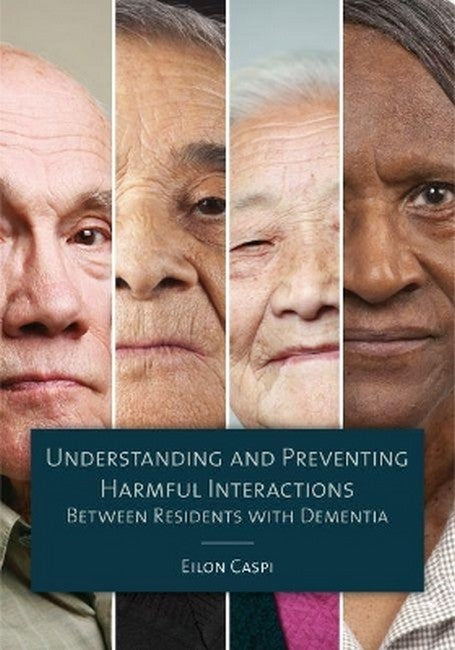Eilon Caspi, Ph.D., is a gerontologist and dementia behavior specialist. He is the founder and director of Dementia Behavior Consulting LLC and a founding member, advisor, and board member of Elder Voice Family Advocates. He currently works as an assistant research professor at the Institute for Collaboration on Health, Intervention, and Policy, University of Connecticut. He serves as a board member of the Long Term Care Community Coalition (NYC). He worked his entire adult life in the aging field, starting as a nurse aide in 1994 in a nursing home where his grandfather lived. Both his grandmothers had dementia and lived in nursing homes. Over the years, he served in various roles, including social worker, consultant, applied researcher, educator, author, volunteer, and elder care advocate. Over the past 13 years, he developed and implemented a comprehensive program for the prevention of the prevalent and harmful phenomenon of resident-to-resident incidents in long-term care homes. He regularly presents on the phenomenon at local, state, national, and international professional and scientific forums, nursing homes, long-term care trade associations, the Alzheimer's Association (U.S. and Canada), the Veterans Administration, the Office of Ombudsman for long-term care, state survey agencies, and coroner offices. He co-directed the first documentary film entitled Fighting for Dignity on injurious and fatal resident-to-resident incidents in dementia (Terra Nova Films). He frequently gives interviews about this phenomenon with media organizations such as The Boston Globe, The Star Tribune, CBC News Canada, The Canadian Press, and Stuff New Zealand. In recent years, he dedicated his research and advocacy to the prevention of various forms of elder mistreatment such as neglect of healthcare, abuse, financial exploitation, and theft of opioid pain medications in assisted living residences and nursing homes. His passion is in bridging between academic/research and care practice/policy. In his free time, he enjoys carving wood and has recently completed hand carving brain hemispheres and educational signs such as SEE ME Not My Dementia, JUSTICE OF ELDERS, ELDERS' VOICE, and ELDERS' LIVES MATTER. Eilon lives in West Harford, CT with his wife, two daughters, and their border collie.
Request Academic Copy
Please copy the ISBN for submitting review copy form
Description
About the Author Foreword Preface AcknowledgmentsIntroduction SECTION I. SPECTRUM OF DHRRIS AND HOW TO APPROACH THEM Spectrum and Consequences Principles for Approaching DHRRIs SECTION II. CONTRIBUTING FACTORS, CAUSES, AND TRIGGERS Resident's History and Background Factors Situational Causes and Triggers Factors in the Physical Environment Factors Related to Care Partners SECTION III. PREVENTION AND DE-ESCALATION STRATEGIES Procedures and Strategies at the Organizational Level Proactive Measures Immediate Strategies During Episodes Post-Episode Strategies APPENDIX A. Assessment Tools and Processes for Prevention of DHRRIs Index
"This is an outstanding resource to use as an educational tool for frontline caregivers and those working with dementia residents especially if they have behaviors that may impact other residents with or without dementia. This book is a vital informational and educational tool...a resource that will benefit any caregiver in any setting that cares for residents living with dementia. It is especially beneficial for those caregivers working on dementia units within nursing homes or other facilities."--Doody's Review (12/5/2022 12:00:00 AM) "An important book for anyone concerned about quality of life, safety, and dignity for individuals living with dementia. Dr. Caspi's knowledge, empathy, and wisdom come through in every chapter."--Richard J. Mollot, Executive Director, Long Term Care Community Coalition (10/26/2021 12:00:00 AM) "Dr. Caspi brings compassion and clarity to the critical issue of harmful interactions between residents with dementia living in long term care homes. His evidence-informed strategies provide practical value for families and care providers who struggle to address and prevent these deeply concerning events."--Mary Schulz, MSW, RSW, Former Director of Education, Alzheimer's Society of Canada (10/26/2021 12:00:00 AM) "This book exposes the hidden public health problems of resident-to-resident aggression in long-term care homes. Had I access to this information, my husband might still be alive. The book should be required reading for those in the healthcare industry who are determined to end this prevalent and harmful form of elder neglect in nursing homes and assisted living residences."--Theresa Piccolo, wife of 68-year-old Frank Piccolo, who lived with dementia and was severely injured by another resident who entered his bedroom. His condition deteriorated after the attack, and he died three months later. (10/26/2021 12:00:00 AM) "Exceptionally well written, organized and presented, Understanding and Preventing Harmful Interactions Between Residents with Dementia is an ideal and seminal instruction manual and guide that will be of immense value to anyone having to care for patients and residents of sheltered care facilities for those suffering from Alzheimer's and other forms of dementia. Also available for personal reading lists in a digital book format, [this book] is an essential and core addition to professional, sheltered care facilities, college, and university library Long Term Nursing, Geriatrics, and Gerontology collections and supplemental studies curriculum syllabus."--Midwest Book Review (10/26/2022 12:00:00 AM) "Caspi illuminates a well-known but, until now, a largely ignored phenomenon of distressing and harmful resident-to-resident interactions (DHRRI) among persons with dementia in long-term care homes. Contributing to keeping this phenomenon invisible is that the CMS database has yet to implement a GAO recommendation that such incidents be tracked and submitted by state survey agencies. At the heart of Caspi's book is the message of person-directed practice. He cautions us that words are powerful and capable of perpetuating harmful beliefs about persons with dementia that will cause some direct care providers to accept negative interactions rather than try to de-escalate through listening, drawing on pearls from the past, and building trust. His 12 principles for approaching DHRRIs provides a framework for direct care providers to better understand the triggers of DHRRI and strategies to prevent or de-escalate harmful interactions. Add this book to your toolkit and appreciate that in better management of negative interactions, positive interactions of human expression will emerge."--Nina M. Silverstein, Ph.D., Professor of Gerontology, University of Massachusetts Boston (10/26/2021 12:00:00 AM)

